

Hattie’s research: egregious errors. The egregious errors that beset John Hattie’s research are so pervasive as to prove difficult to encompass and thus lay bare – but various insights local and international are at last coming together to achieve just that.
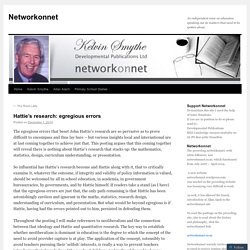
This posting argues that this coming together will reveal there is nothing about Hattie’s research that stacks up: the mathematics, statistics, design, curriculum understanding, or presentation. So influential has Hattie’s research become and Hattie along with it, that to critically examine it, whatever the outcome, if integrity and validity of policy information is valued, should be welcomed by all in school education, in academia, in government bureaucracies, by governments, and by Hattie himself. If readers take a stand (as I have) that the egregious errors are just that, the only path remaining is that Hattie has been astonishingly careless and ignorant in the maths, statistics, research design, understanding of curriculum, and presentation. The Rock Lady Like this: Study: '21st Century Learning' Demands Mix of Abilities - Inside School Research.
The modern workplace and lifestyle demand that students balance cognitive, personal, and interpersonal abilities, but current education policy discussions have not defined those abilities well, according to a special report released this afternoon by the National Research Council of the National Academies of Science in Washington.
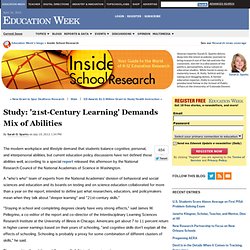
A "who's who" team of experts from the National Academies' division of behavioral and social sciences and education and its boards on testing and on science education collaborated for more than a year on the report, intended to define just what researchers, educators, and policymakers mean when they talk about "deeper learning" and "21st-century skills. " "Staying in school and completing degrees clearly have very strong effects," said James W. Pellegrino, a co-editor of the report and co-director of the Interdisciplinary Learning Sciences Research Institute at the University of Illinois in Chicago. Ms. Games Based Learning Research from Victoria State Government. Web addicts have brain changes, research suggests. Doing Internet Research at the Elementary Level.
One of the hardest things to teach, in my opinion, is research.
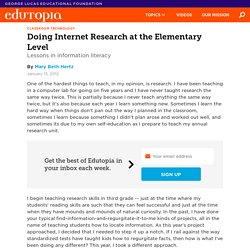
I have been teaching in a computer lab for going on five years and I have never taught research the same way twice. This is partially because I never teach anything the same way twice, but it's also because each year I learn something new. Sometimes I learn the hard way when things don't pan out the way I planned in the classroom, sometimes I learn because something I didn't plan arose and worked out well, and sometimes its due to my own self-education as I prepare to teach my annual research unit. I begin teaching research skills in third grade -- just at the time where my students' reading skills are such that they can feel successful and just at the time when they have mounds and mounds of natural curiosity. In the past, I have done your typical find-information-and-regurgitate-it-to-me kinds of projects, all in the name of teaching students how to locate information.
Choosing a Topic, Creating Keywords and Search Terms. Reader. Meeting the Needs of All Learners: Implementing Action Research - Finding Common Ground. Don't keep moving forward toward the iceberg when you know it's going to sink your ship.
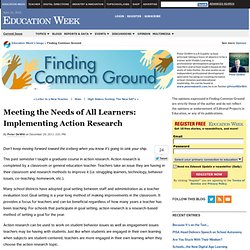
This past semester I taught a graduate course in action research. Action research is completed by a classroom or general education teacher. Teachers take an issue they are having in their classroom and research methods to improve it (i.e. struggling learners, technology, behavior issues, co-teaching, homework, etc.). Many school districts have adopted goal setting between staff and administration as a teacher evaluation tool.
Goal setting is a year long method of making improvements in the classroom. Action research can be used to work on student behavior issues as well as engagement issues teachers may be having with students. First and foremost, teachers need to identify the problem or they can identify the area that they would like to improve. Secondly, educators need to search for articles about the issue. The implementation stage of a new intervention takes a great deal of time. ADDIE Process of Instructional Design. Using Inquiry-Research Projects to Teach the Right Skills for a New Age - Philadelphia, PA, United States, ASCD EDge Blog post. In my last blog, “Teaching the Right Skills for a New Age”, I described five key skill areas students must develop if they are to be prepared for continuous learning in this new age: Asking questions, formulating problems and challenges Searching for and processing information Thinking deeply and flexibly Drawing conclusions, applying learning Communicating effectively Together, they form an “Inquiry” or “Research Based” Instruction model for teaching and learning.
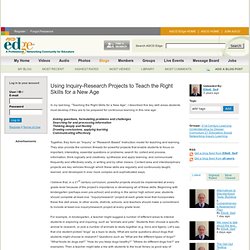
I believe that, in a 21st century curriculum, powerful projects should be implemented at every grade level because of the project’s importance in developing all of these skills.